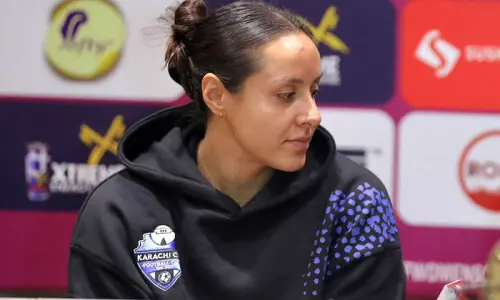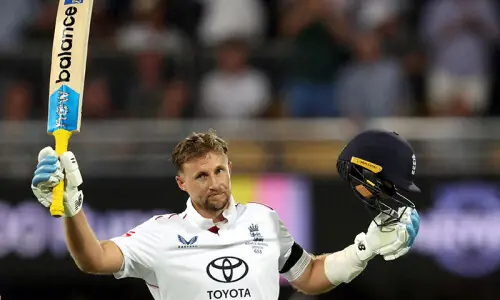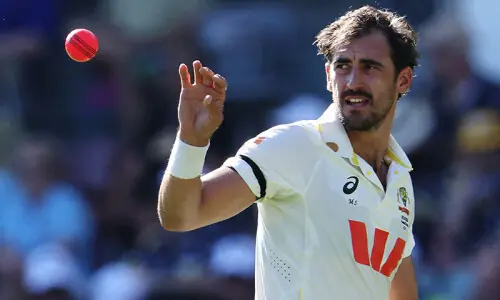
The first part of this series highlighted the humble beginnings and background of football in Pakistan, and how it emerged in the fledging Asian football circuit with limited finances but a steady supply of talented players. It was an era that held a lot of promise for the future of the game but the circumstances did not allow for Pakistani footballers to realise their true potential. Lack of professionalism, dedicated football clubs, league competitions, sponsors and media coverage meant the game needed a lot of improvement. Cricket and hockey dominated the sporting headlines, while football attempted to make an impact.
Asian football was also quite inconsistent and while healthy competitions (Asian Games and Asian Cup) were held, it was mainly the financially sound teams, who managed to make foreign tours. The action was often restricted to East Asia and sometimes Iran. The rest of the Middle East was still considered a backwater for football, while South Asia, despite its much deep-rooted football history, was slowly coming to terms with the steady progress being made in Asian football.
Failure to qualify for the 1960 AFC Asian Cup was the first of many ups and downs Pakistani football would face as it entered arguably its ‘golden era’ of the 1960s.
1960s: The golden age Sport in Pakistan made a spectacular start to the sixties as the hockey team won its first Olympic gold when it broke the Indian juggernaut with a 1–0 win at the Rome Olympics. Cricket was slowly capturing the imaginations of the public through radio commentary about the exploits of Hanif Mohammad, Fazal Mahmood, Javed Burki and others. Squash saw the rise of the Khan dynasty as Roshan Khan and Hashim Khan put their opponents to the sword in the British Open.

Football made its way through the streets of Quetta, Karachi, and Dacca as it tried to show consistency at domestic and international levels. The dominance of Karachi and Dacca began to show when the two cities won five consecutive national championships between 1960 and 1966 (Dacca: 1960, 1962 and Karachi: 1963, 1964–65 and 1966). Dacca continued its pre-partition football tradtions through the well-organised and well-attended Dacca League that gave a level of competitive professionalism in East Pakistan, which West Pakistan had been missing. East Pakistan would also give Pakistan its best players from that era until Bangladesh’s independence in 1971, including Ghulam Rabbani, Mohammad Umar, Abdul Ghafoor Majna, Moosa Ghazi, Abdullah Rahi, Abid Ghazi, Hussain Killer, Turab Ali, Murad Bakhsh Makwa, Yousuf Senior. Ayub Dar, Lala Hashim, M.N. Jahan, Mola Bakhsh Gotai, Qadir Bakhsh Putla, Yousuf Jr. Ghulam Hussain Patoo and Khamisa Boss.

Mohammedan Sporting of Dacca was perhaps the most popular team of the region while Chittagong also showed a lot of promise. Former national captain, and ‘the Pakistani Pele’, Abdul Ghafoor played some of his best football in the Dacca League for Mohammedan Sporting in the 1960s.
Meanwhile, Karachi had a unique flavour in its football, which grew in the slum areas of Orangi, Landhi, Korangi, Malir, and Lyari. These areas were often filled with the Sheedi and Makrani communities, who had long been involved in football. This was a time when football matches would witness jam packed crowds and footballers enjoyed celebrity status. Many players from Quetta, and rest of Pakistan, would travel all the way to Karachi, hoping to make it big on the football scene. Not only that, but the game gained such popularity that parents would encourage their kids to take up the game, with the hope that they would get noticed and secure jobs with the government and also get a chance to represent Pakistan at the international level.
This was the decade that saw many foreign teams often tour Pakistan for unofficial friendly matches during their off-seasons. Among them included a Chinese XI (1963), Indonesia (1964), FC Neftyanik from Soviet Union (Nov 1964) alongside some youth teams from USSR coming on goodwill visits. Pakistan reciprocated by touring these countries in the late 60’s.
Some of the most memorable tours in Pakistan during the 1960s involved teams from Germany, USA, and the Saudi Arabia. In 1963, whilst on a world tour, German Bundesliga side Fortuna Düsseldorf had to make an emergency stop in Pakistan due to aircraft problems, leaving them stranded for a few days. When the word of their stay spread, the PFF invited Fortuna to tour East and West Pakistan playing friendly matches against select XI sides. Having plenty of time to kill, Fortuna happily accepted the offer and played against sides like East Pakistan Sports Board XI in Dacca (which including the veteran Qayyum Ali Changezi) to crowds of thousands.

Similarly, the Dallas Tornado side of the North American Soccer League (NASL) went on an ambitious world tour that took them from Europe to Middle East to Vietnam and other places from September 1967 to March 1968.

During the trip, the team made a week’s stop in Pakistan in October–November 1967, where they played the Pakistan national team in Karachi, Lahore and Dacca.
Saudi Arabia’s national team also toured Pakistan in 1967, when they played a four-match series against Pakistan, resulting in three 2–2 draws and one 1–1 draw.


Pakistan participated in various friendly tournaments, with the Merdeka Cup hosted in Malaysia being the most prominent. The Merdeka Cup was the football equivalent of the popular hockey tournament hosted in Malaysia, Sultan Azlan Shah Tournament. The 1960 and 1962 editions saw Pakistan play Asian giants Malaysia, Indonesia, Japan, Thailand, and Burma. Pakistan recorded some famous victories including a 7–0 walloping of Thailand and a 3–1 win over current Asian powerhouses Japan in the 1960 Merdeka Cup. That 7–0 victory over Thailand remained Pakistan’s biggest win for almost half a century until they beat Guam 9–2 in the 2008 AFC Challenge Cup qualifiers.
The political climate of that era was marked by Pakistan’s relative closeness to Turkey and Iran in the form of pacts and treaties that became part of RCD (later ECO) accords. A series of friendly tournaments involving the three teams became known as the RCD Cup where Pakistan fell short against the two bigger teams. This tournament also marked Pakistan’s first instance of competing against a Uefa member country.
Despite the growth of the game during the 1960s, Pakistan did not take active part in the Asian Games football tournaments of 1962, 1966 and 1970 due to financial constraints. The World Cup qualifiers were once again no different as Pakistan began missing out on important matches due to lack of interest from the federation and poor government support.
However, Pakistan participate t in the qualifiers for the 1964 Olympic Games which included a home-and-away tie with Iran in November–December 1963, which resulted in a 4–1 loss in Iran and a 1–0 win in Pakistan. Qualifiers for the 1968 AFC Asian Cup were no different as Pakistan failed to make it to the finals after losing to hosts Burma 2–0, Cambodia (then Khmer) 1–0, and drawing 1–1 against India in August 1967. The close of the decade highlighted the talent pool and also the need for development of the game. However, much bleaker times were to come.
1970s: The dark era Pakistani football had a fairly low-key start as to the 1970s. Pakistan competed against Turkey and Iran in the third RCD Cup but the results did not do much to boost the team as Pakistan suffered a 7–0 loss against Iran in Tehran and 3–1 against Turkey. On the domestic front, the 1969–70 National Championship was won by Chittagong in East Pakistan as they beat Peshawar in the final at Comilla. A year later, in February–March 1971, PIA won its first ever national championship in Multan after overcoming Karachi in the final. No records of any teams from East Pakistan taking part that year exist.
The dark ages of Pakistani football soon followed. East Pakistan revolted and eventually became Bangladesh in December 1971. Political fall-out of the event aside, Pakistani football was dealt a lethal blow. Not only did Bangladesh inherit all of the better football infrastructure of East Pakistan, but also the players, and the Dacca (now Dhaka) Football League.
East Pakistani football was better organised and maintained as compared to West Pakistan and the fall of Dhaka dealt a severe blow to the game’s future in Pakistan. The national team did not compete again until 1973 when it sent its youth teams for a friendly tour of Iran and then China. Pakistan did, however, take part in the 1974 Asian Games football tournament and apart from heavy losses against hosts Iran (7–0 again) and Burma (5–1) Pakistan registered a did register a 5–1win over Middle East up starts Bahrain.
The 1974 Asian Games turned out to be the only international tournament for Pakistan during the 1970s. Football was in the wilderness and only survived on the basis of sports budgets of departments like WAPDA, Army, KESC, SSGC, PIA and Railways, which hired footballers as employees and provided them with a basic wage to play for their sides and work full time in the off-season.
During this dark period, however, several local leagues were launched across the Middle East in countries like the UAE, Bahrain, Qatar, Oman, Kuwait, and Saudi Arabia. These oil-rich nations funded teams that helped boost their national sides at a frantic pace. Several Pakistani players including Mola Bakhsh Momin, Ali Nawaz Baloch, Ghulam Sarwar Sr., Ali Asghar ‘Tony’, M. Idrees (PIA), represented club sides in these leagues and some of these players even coached the clubs’ new youth setups.
In November, 1976, Karachi hosted the Quaid-i-Azam Birth Centenary Triangular Football League. Kwangtung (China) won the inaugural league (four points), while Pakistan Green (two points) finished second and Afghanistan (0) third. In May 1978, Pakistan faced South Korea in their last international match of the decade in Saudi Arabia, which they lost 5–0.
1980–1984: Revival of international football The 1980s saw a modest rekindling of the beautiful game in Pakistan. Karachi-based PIA won its sixth national championship in 10 years when they beat PAF in the final at Peshawar May 04, 1981. A few months later, Pakistan competed in the King’s Gold Cup in Thailand in November 1981, and despite not having played competitive international football for three years, Pakistan impressed with a goal-less draw against Indonesia, 1–0 loss at the hands of Thailand and China, and beat Malaysia 3–2 and Singapore 1–0 – and ended up finishing third in their pool behind Thailand and China.
Before participating in the King’s Gold Cup, the Pakistan team made a six-day goodwill tour of Burma for two friendly matches, which ended in a 0–1 loss against Aung Sen Selected XI and a 0–0 draw against Burma.
Pakistan invited a few Asian countries to participate in the Quaid-i-Azam Gold Cup in February 1982, against whom they showed satisfactory performances. It included wins by the senior team, Pakistan Blues, over Bangladesh (2–0) and Nepal (2–1), a 0–0 draw with Oman, and a 1–4 loss to Iran. Pakistan also competed in the Asian Youth Championship qualifiers in Nepal after a gap of 20 years in November 1982.
During this period, Pakistan’s international self-exile had more or less ended completely but regular action still seemed difficult to accomplish.
Pakistan participated in the 1984 Merdeka Cup (Malaysia), and finished the tournament ranked fifth. Of their five matches, Pakistan won 2–0 against Algeria XI with both goals scored by Sharafat Ali (Wapda) but lost the remaining four matches: 1–6 against South Korea, 1–6 against China, 0–2 against Malaysia Tiger and 1–2 against Argentina XI.
In October 1984, Pakistan travelled to India for the Asian Cup qualifiers but were met with disappointment as they lost against Malaysia (0–5), South Korea (0–6), and India (0–2). Pakistan did however beat North Yemen 4–1 and finished fourth in their group, while South Korea and India qualified for the final round.
Some of the best players from the era who won domestic honours and played for Pakistan in the early half of the 1980s were Sharafat Ali, Naeem Gul, Naushad Baloch, Shamim Khan (current PIA coach), Matin Akhtar, Ghulam Sarwar Sr. Khalid Butt (current WAPDA coach), Mohammad Rashid (ex-Pakistan coach), Mohammad Akbar, Pervez Ramzan and Shoukat Mufti.
[To be continued…]
The writer is the chief editor, Pakistan correspondent and forum administrator of FootballPakistan.Com and would like to thank the co-founder, webmaster, and chief editor of FPDC Malik Riaz Hai Naveed, veteran football journalist Riaz Ahmed, and the Pakistan Football Federation for providing information that helped create this article chronicling the history for Pakistani football.
Selected Pakistan internationals between 1960 and 1984 1960 – Merdeka Cup – Kuala Lumpur, Malaysia Manager: A.B.S. Safdar, Referee: Bahadur Khan, Coach: Sahab Ali, Captain: Qayyum Changezi Pakistan 7–0 Thailand Malaysia 1–0 Pakistan Pakistan 3–1 Japan Pakistan 0–4 Indonesia
1961 – Burma in Pakistan First Test: Burma 3–1 Pakistan Second Test: 4–0 Third Test: Pakistan 1–1 Burma Burma 9–0 East Pakistan XI
1962 – Fourth Asian Youth Tournament, Bangkok Manager: Sq. Ldr. A.R. Siddiqui, Coach & Referee Bahadur Khan, Captain: Salim Hong Kong 4–2 Pakistan Pakistan 4–0 Singapore Pakistan 3–0 Malaysia South Korea 4–0 Pakistan Pakistan did not qualify for final round.
1962 – Merdeka Cup – Kuala Lumpur, Malaysia Manager: W/C Qureshi, Coach: George Ausley, Captain M. Umar Pakistan 1–0 Burma Pakistan 1–1 Japan Pakistan 0–0 Malaysia Final: Indonesia 2–0 Pakistan
1963 – China in Pakistan Manager: A. Afzal, Coach: Saheb Ali, Captain: Mohammad Umar First Test, Dhaka: Pakistan 0–0 China Second Test, Peshawar: Pakistan 3–2 China Third Test, Lahore: Pakistan 1–1 China Fourth Test, Karachi: China 2–0 Pakistan
1963 – Pre-Olympic Qualifiers, Tehran and Karachi Manager: Lt. Col. M. Saleem Khan, Captain: Mohammad Amin First leg: Iran 4–1 Pakistan Second leg: Pakistan 1–0 Iran
1964 – Pakistan in China Manager: Wing Cmdr Asghar Hussain, Coach: Fl. Lt. Atiq Ahmad, Captain: Abid Hussain Ghazi Pakistan 2–0 China (unofficial Test)
1967 – Saudi Arabia in Pakistan Captain: Turab Ali First Test (unofficial): Pakistan 3–1 Saudi Arabia Second Test (unofficial)Saudi Arabia 4–2 Pakistan (unofficial) Third Test (unofficial)Pakistan 2–2 Saudi Arabia
1967 – Asian Cup Qualifiers – Rangoon (Burma) Manager: M.A. Hannan, Coach: Mohammad Amin, Captain: Turab Ali Burma 2–0 Pakistan Cambodia 1–0 Pakistan Pakistan 1–1 India
1967 – RCD Tournament, Dhaka Turkey 7–4 Pakistan Iran 2–0 Pakistan
1973 – Pakistan in China Manager: Maj. M. Husain Malik, Coach M. Amin, Captain: Moula Bakhsh China 7–4 Pakistan China 1–1 Pakistan
1974 – Fourth RCD Championship, Karachi Turkey 1–0 Iran Turkey 2–2 Pakistan Iran 2–Pakistan
1974 – Asian Games, Tehran Iran 7–0 Pakistan Pakistan 5–1 Bahrain Burma 5–1 Pakistan
1982 – Quaid-e-Azam National Football Tournament, Karachi Pakistan Green: Manager: Ibne Ali, Coach: Younus Rana, Captain M. Akbar Pakistan Blues: Manager: Sq. Ld. Sardar Khan, Coach: Murad Bakhsh Pakistan Blues 1–1 Nepal Pakistan Blues 2–1 Bangladesh Iran 1–0 Pakistan White Pakistan Blues 2–1 China Iran 4–1 Pakistan Blues China 4–1 Pakistan White Pakistan Blues 0–0 Pakistan White Pakistan White 0–0 Oman Pakistan Green 2–1 Nepal Pakistan Blues 2–1 Oman Standings: First – Iran, Second –Pakistan Blues (Jr.), Third – Pakistan White


































